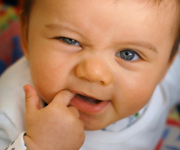DOCTORS, nurses, pharmacists and families should be warned of the dangers of intoxication in infants caused by teething gels containing salicylate, according to a group of medical specialists.
An article published in “Lessons from Practice” in the latest MJA described two cases of infants with chronic toxicity which confounded medical practitioners treating the children until the link to teething gels was discovered.(1)
The cases highlighted the value of taking detailed medication histories for people presenting with unexplained intoxication.
The specialists — Dr Gary Williams, a paediatric intensivist, and Dr Edwin Kirk, a clinical geneticist, both at Sydney Children’s Hospital, Dr Betty Chan, an emergency physician and toxicologist at the Prince of Wales Hospital, Sydney, and Dr Callum Wilson and Dr Caroline Meadows, paediatricians from New Zealand — said warnings were currently not present on several salicylate-containing gels marketed for infants in Australia and NZ.
They said there had been several cases of salicylate intoxication by unintentional overdose of teething gels reported to the NZ National Poisons Centre.
“It is important to appreciate that dosing of this gel directly from the tube is potentially inaccurate, increasing its risks of causing chronic toxicity,” the authors said.
In one of the two cases outlined in the article, a 7-month-old boy presented with a 24-hour history of restlessness, tachypnoea, poor feeding and vomiting.
The infant’s medical history was unremarkable, his body weight was normal and there was no family history of note.
The family said he had not been given any medications apart from paracetamol.
Tests results of arterial blood gas levels showed a well compensated anion-gap metabolic acidosis, with a lactate level of 7.8 mmol/L, compared to normal levels of less than 2 mmol/L.
The infant’s vital signs were unremarkable apart from persistent tachypnoea, hyperpnoea and periods of lethargy. The unexplained anion-gap metabolic acidosis also persisted.
Intravenous dextrose and oral multivitamins were administered, as well as IV bolus doses and continuing infusions of sodium benzoate and arginine.
However, over the following 8 hours the infant’s conscious state deteriorated and he required intubation. Over the next 12 hours, with a regimen of urine alkalinisation and potassium supplementation, his condition improved and he became more interactive and responsive.
The following day a detailed examination of the family’s home medicine cupboard revealed teething gel containing 8.7% choline salicylate, which the family admitted to frequently using on the infant’s gums in the previous 2 months.
It was estimated he received about 60 mg/kg of salicylate each day.
Seventy-two hours after admission the infant was discharged with normal neurological signs.
In the other case a 13-month-old girl had shown gradual deterioration in weight since 9 months of age.
Persistent questioning led to the family admitting to frequently giving the child teething gel containing 8.7% salicylate over several months and, on occasion, using a whole tube at night to settle her.
She also made a good recovery after treatment and her normal growth pattern resumed when the gel was stopped.
The authors said that as the Therapeutic Goods Administration in Australia regards teething gels as “therapeutic goods” they should be subject to the requirement that labels of over-the-counter aspirin-containing products include a warning statement.
– Kath Ryan
Posted 7 February 2011

 more_vert
more_vert
While Bonjela was reformulated in the UK to remove salicylate salts (stimulated by the UK’s Medicines and Healthcare Products Regulatory Agency) the Australian sponsor (Reckitt Benckiser) did not (apparently because the Australian Therapeutic Goods Administration and NZ Medsafe were unconcerned).
Instead, Reckitt Benckiser launched a promotional campaign, “Rebuilding Trust for Bonjela”.
The marketing strategy was for Bonjela to become a supporter of Tresillian, Australia’s largest child and family health centre, and to run a grassroots and media and retail campaign, “Australia’s most trusted teething gel” which included the launch of http://www.bonjela.com.au.That website does not disclose the fact that Bonjela contains choline salicylate (http://www.bonjela.com.au/bonjela-teething-gel.php).
Ironically, the advice to mothers on the Tresillian website about teething says, “Teething Gels: Teething gels massaged into the gums with a clean finger can provide relief. Look for ones that are sugar-free, colour-free, alcohol free and ASPRIN free (my emphasis) and make sure you check the dosage instructions and expiry date very carefully. (Always read the label). If unsure consult your doctor”.
There are many alternative non-drug remedies for teething discomfort, such as clean chilled teething rings.
My own view is that the TGA and NZ Medsafe should no longer allow choline salicylate to be incorporated in teething gels. An alternative approach is to require appropriate warnings on the ARTG Public Summary, the label and all promotional material as the MJA article authors suggest.